[Editor’s note: This article contains discussion of residential schools and residential school denialism. It may be triggering to some readers.]
First Nations leaders and local community members crowded the Quesnel council chambers on Tuesday evening, many intent on sending a strong message to the city’s mayor: It’s time to step down.
Mayor Ron Paull has been embroiled in controversy since it came to light two weeks ago that his wife, Pat Morton, had been promoting a book in the community that denies the experiences of Indigenous survivors of residential schools. On Tuesday, two city councillors also accused Paull of sharing the controversial book, allegations that he denied. The mayor said he intends to hold his position until the next election in 2026.
News about the mayor’s connection to the book emerged at a March 19 council meeting. It brought swift condemnation from other council members, First Nations leaders and the Quesnel Board of Education, which issued a statement saying it had received a copy and denounced the book.
Grave Error: How the Media Misled Us (and the Truth about Residential Schools) is a controversial collection of essays published last year by right-wing news outlet True North. The book makes the incorrect claim that survivors’ stories about residential schools — federal institutions Indigenous children were forced to attend, where they were separated from their families and culture, were frequently abused and died at high rates as a result of overcrowding, malnutrition and disease — are “either totally false or grossly exaggerated.”
The 2015 final report of the Truth and Reconciliation Commission of Canada estimated that more than 4,000 children died at residential schools, a number that has since been increased to more than 6,000 — and likely higher — by TRC chair Murray Sinclair. The Canadian government operated the institutions from 1883 to 1996.
Many were present at Tuesday’s meeting to address the mayor directly and call for his resignation. Chief Clifford Lebrun with the local Lhtako Dene Nation said the nation will pause work with Quesnel city council until the issue is resolved.
“We have a whole room full of Elders and survivors here. They could go on all night and tell you what they went through,” Lebrun told council. “We’ve all seen the end results of the Truth and Reconciliation Commission’s final report. This happened. It’s not going away.”
When news emerged last month that Morton had been distributing Grave Error within the community — including giving a copy to the mother of an Indigenous council member whose father is a residential school survivor — Paull said he didn’t agree with his wife’s actions and distanced himself from the book.
“I haven’t even opened it,” he told council. “I’ve got no interest in looking at it.”
But Coun. Scott Elliott said Tuesday that wasn’t true.
“Mr. Mayor, you lied to me, to council, our First Nations, our community and the nation,” Elliott said. “I have no choice but to ask for your official resignation from office as a mayor so we can repair the damage done by you and your wife.”
Coun. Laurey-Anne Roodenburg, who serves as the Indigenous relations representative on council, also accused the mayor of lying, and named two people whom she said the mayor had discussed the book with at a recent Cariboo Regional District board meeting.
“The mayor of 100 Mile House, Mayor [Maureen] Pinkney, said his comment to her as he tried to give it to her was that ‘it’s always good to have both sides of the story,’” Roodenburg said, adding that Paull had also tried to give a copy to CRD board chair Margo Wagner.
“When she said, ‘No thanks,’ he told her it was a good read,” Roodenburg said.
Paull said it was “false” that he had distributed the book and added that the exchange occurred during a discussion about books “that were characterized as being disturbing.”
“They were books on SOGI, which is sexual orientation and gender identity, in one of the local libraries,” Paull said. He added that he had used the Grave Error book as an example of “what would happen” if a book that controversial were submitted for inclusion in the library’s catalogue.
“I did not offer it. I was just using it to make a point. I have not distributed that book to anyone,” Paull said.
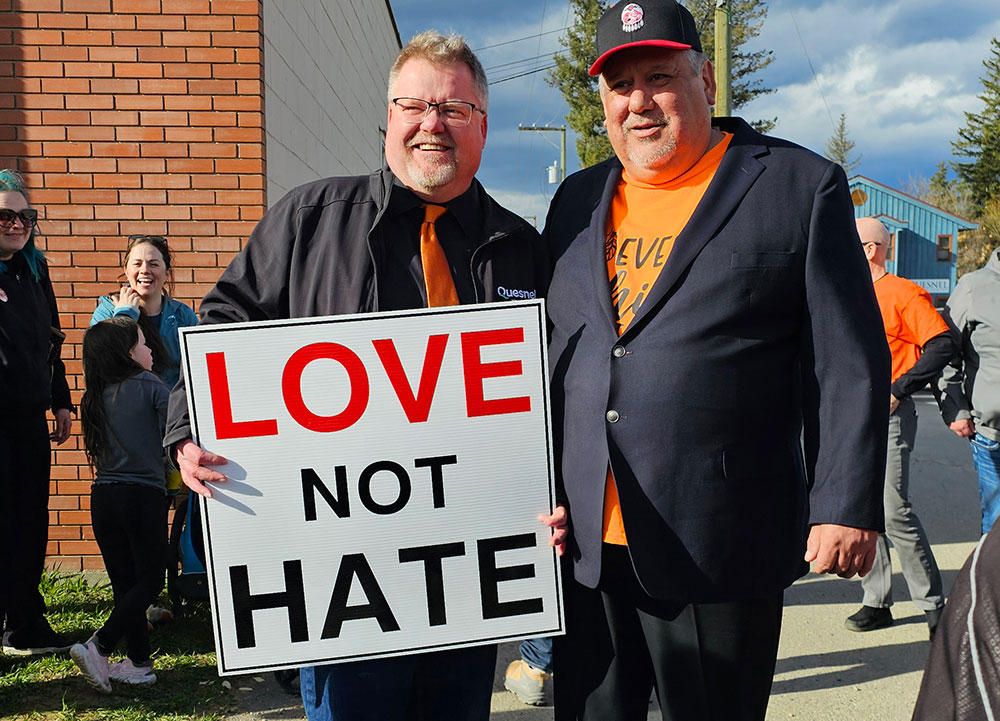
The horrific experiences of many who attended residential schools became international news in May 2021 after Tk’emlúps te Secwépemc, a First Nation in B.C.’s Interior, announced that ground-penetrating radar had identified what were believed to be more than 200 unmarked graves at the former Kamloops Indian Residential School.
“We had a knowing in our community that we were able to verify,” Kukpi7 Rosanne Casimir said at the time. “To our knowledge, these missing children are undocumented deaths.”
Other searches followed, with the federal government announcing funding in August 2021 to “research and locate burial sites” associated with former residential schools. To date, more than 2,000 likely unmarked graves have been identified, according to a recent report, including dozens announced in 2022 by the Williams Lake First Nation at the St. Joseph’s Mission Residential School south of Quesnel.
Ground-penetrating radar, or GPR, is a tool used by trained technicians to identify anomalies under the earth. While results are not 100 per cent conclusive, the technology offers clues about what is buried and how it arrived there — in the case of unmarked burials, disturbed soil known as a “grave shaft” can indicate a grave site. GPR is used in conjunction with other evidence, such as Elder testimony and community knowledge.
Recent GPR evidence supports years of oral testimony by Indigenous survivors of residential schools, according to Sean Carleton, a settler historian and assistant professor in the departments of history and Indigenous studies at the University of Manitoba. Many survivors’ stories were documented by Canada’s Truth and Reconciliation Commission, which spent six years travelling around Canada and hearing from 6,500 witnesses.
The commission documented many stories of unmarked, poorly marked and “common” graves at residential schools, as well as stories about Indigenous children who never returned home.
“One of the purposes of the Truth and Reconciliation Commission was to actually get to the truth,” Carleton said. “With oral testimony and historical documents, areas of interest can be identified and ground-penetrating radar can be another layer to potentially identify possible unmarked burial grounds.”
But a growing movement to deny the experiences of residential school survivors has leveraged uncertainty around GPR searches to suggest that no evidence exists of unmarked burials at residential schools. Some suggest that only excavating the sites will provide conclusive evidence.
Carleton said that denying the harms of residential schools is a tactic meant to preserve the status quo and delay reconciliation. He said rhetoric that frames denialism as “just asking questions” or examining “both sides” of the residential school legacy is thinly veiled anti-Indigenous racism.
“What the book is trying to do is backslide. It’s trying to question what we’ve already established as the truth,” he said.
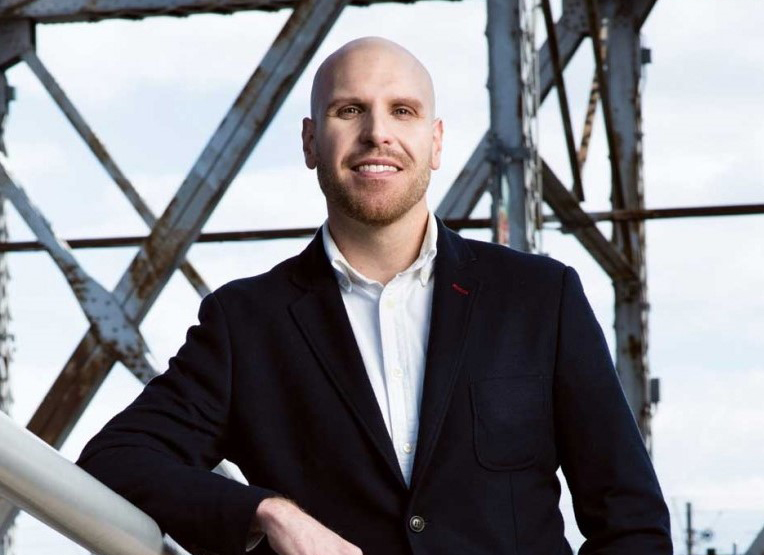
The controversy in Quesnel has been met with a wave of support for residential school survivors, including statements from the Union of BC Indian Chiefs, the BC Assembly of First Nations and the BC General Employees’ Union.
Following on a letter from the Lhtako Dene Nation read at the March 19 meeting, on Tuesday evening council also heard letters from the Nazko First Nation and the North Cariboo Métis Association. These letters called on council to condemn the spread of disinformation related to residential schools in order to move forward on healing and reconciliation.
Local First Nations leaders also spoke on Tuesday evening, followed by the chance for community members to provide a short comment or ask a question. Roughly a dozen people approached the microphone to share emotional stories about the effects of residential schools.
Among those who spoke was Lhtako Dene Elder Bryant Paul, a survivor from St. Joseph’s Mission Residential School.
“Whoever wrote that book, they weren’t in residential school with us. They didn’t know what we went through. But I did. How they treated us. They beat us, sexually abused us, took our language away, our spirituality,” he said. “That book is just a bunch of lies. I was trying to read it and I couldn’t read it. Tears started coming down my eyes. It hurt me.”
While repeated calls for the mayor’s resignation met with cheers from the gallery, not everyone was there to ask Paull to step down.
Supporters included Paull’s wife, Morton, whose short appearance was met with boos and frequent interruptions. She was followed by Frances Widdowson, one of the book’s contributors and a former professor fired from Calgary’s Mount Royal University over her support for the “educational benefits” of residential schools and her criticism of the Black Lives Matter movement.
Widdowson suggested Quesnel city council was spreading misinformation by reading into the record letters acknowledging the experiences of residential school survivors. “There is no evidence of unmarked graves at the Kamloops Indian Residential School,” she said, a claim she repeated until she was drowned out by a rising chorus of singing and drumming as people stood and began leaving the council chambers.
“Ma’am, you are not welcome here,” Coun. Elliott told her.
Couns. Elliott, Roodenburg and Tony Goulet, who is Métis and whose mother was given a copy of the book, all called on the mayor to step down. Goulet shared his experience over the past two weeks, saying he has been questioned about his family’s residential school experience and whether he read the book.
“Yes, I did read the book,” he said. “It’s not a good read, I’ll be quite honest with you, from an Indigenous perspective.” But he added, “It’s not about the book. I think we have to come back to the position of the mayor and how we fix, as a council, how we move forward.”
Speaking with The Tyee after the meeting, Elliott expressed regret that council’s work to build a relationship with the Lhtako Dene Nation had experienced a setback. In February, the two governments became the first municipality and First Nation to partner in hosting the BC Winter Games, which was officially named the Lhtako Quesnel 2024 BC Winter Games to mark the occasion.
“We took a lot of pride in working with Lhtako Dene on that,” Elliott said. He said the mayor’s unwillingness to apologize leaves a great deal of uncertainty about whether the relationship can be brought back on track. “Ultimately, it’s up to the First Nations. But my prediction is, at this point, unless there’s some clarity coming from the mayor, we’re just going to move forward without him.”
Asked at the meeting if he would apologize, Paull declined. “I am guilty by association,” he said. “I will express regret that all this has happened.”
But the mayor was resolute that he will not resign.
“I don’t intend on going anywhere,” he said. “I intend on working my heart out to further the objectives of reconciliation.” ![]()
Read more: Indigenous, Rights + Justice, Municipal Politics


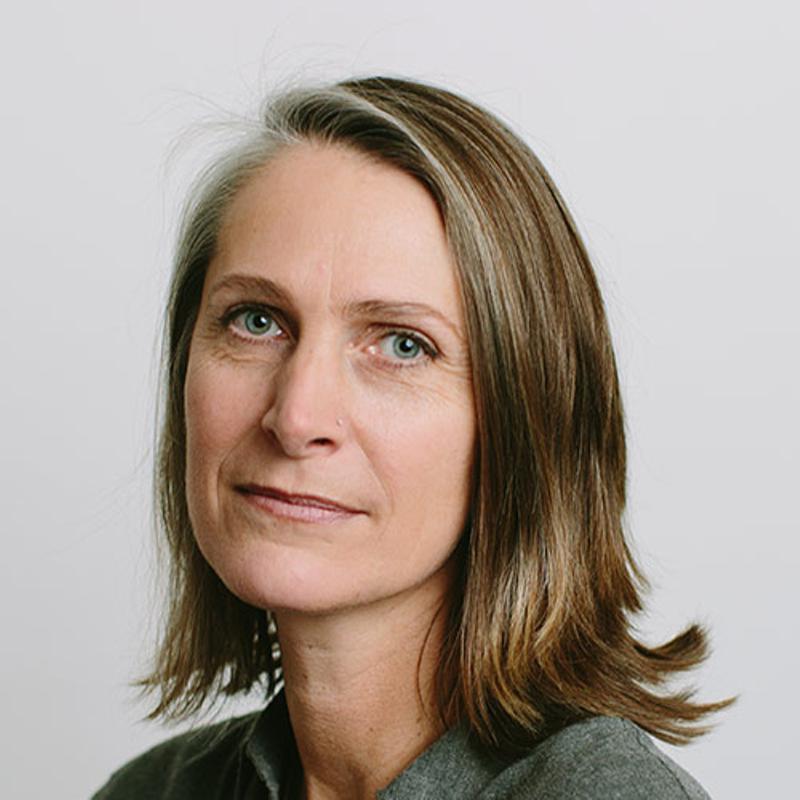

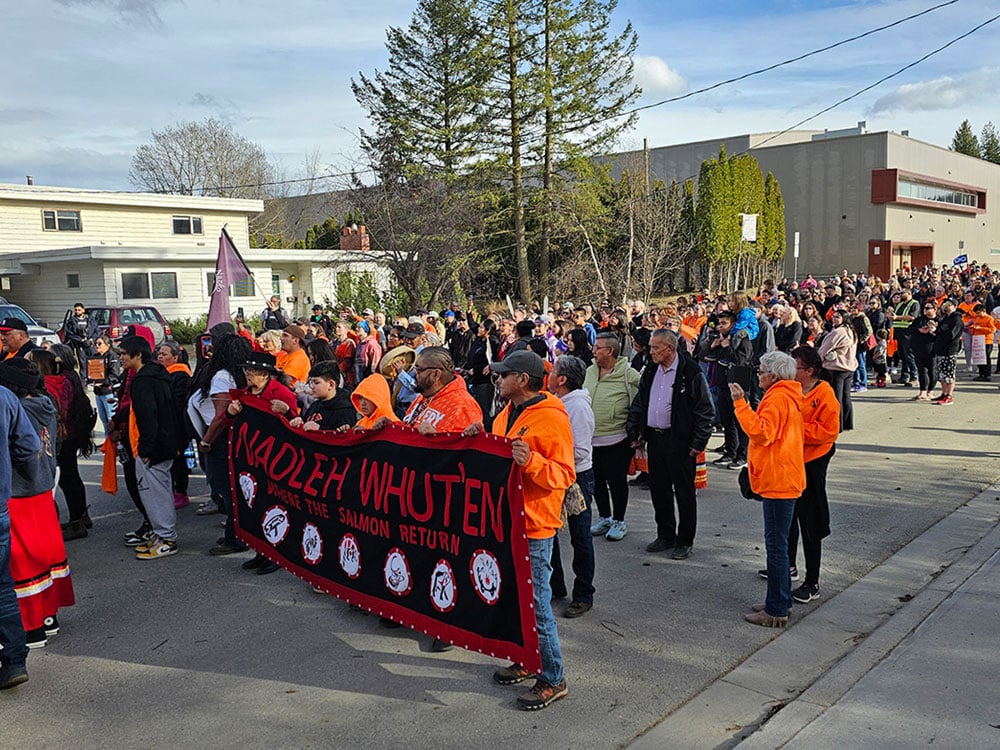
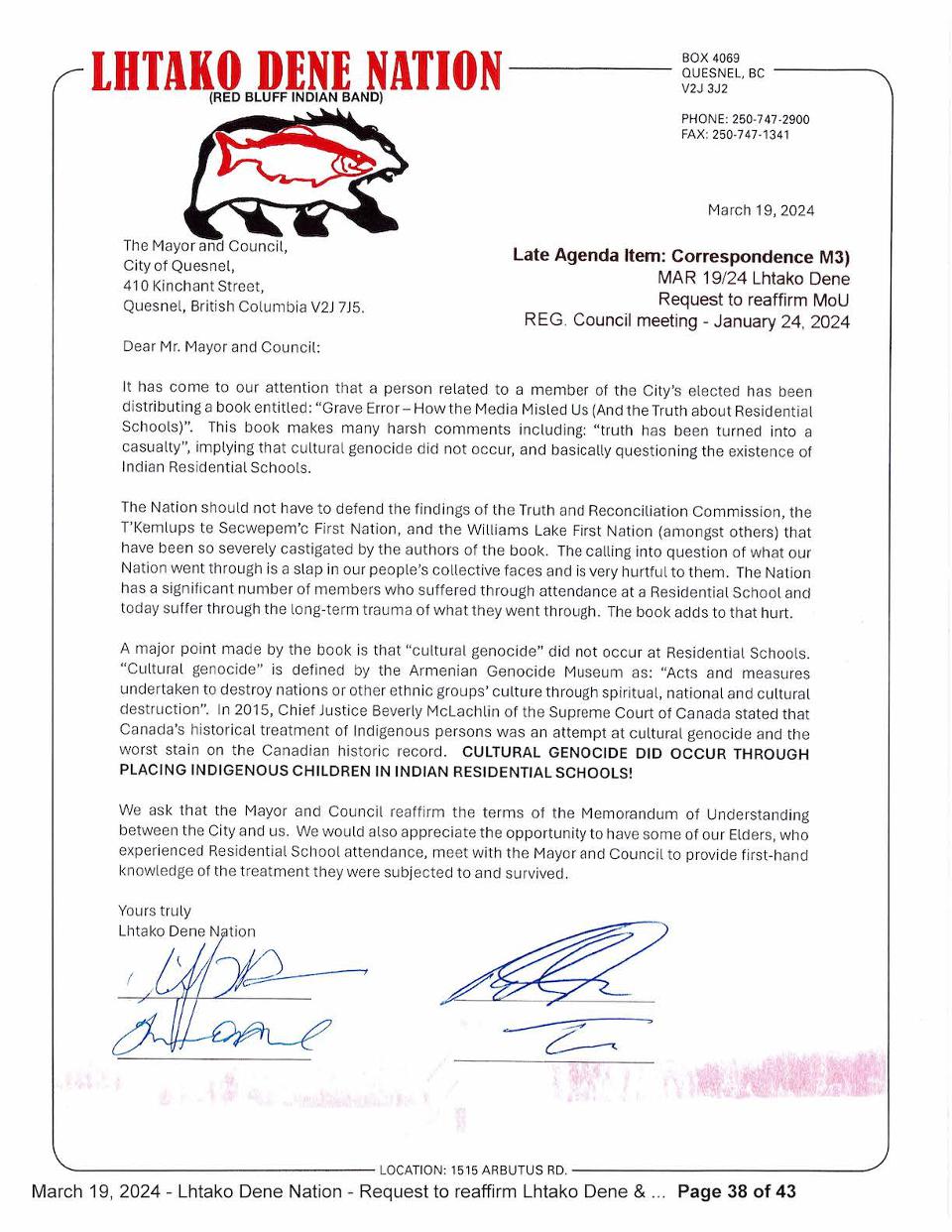
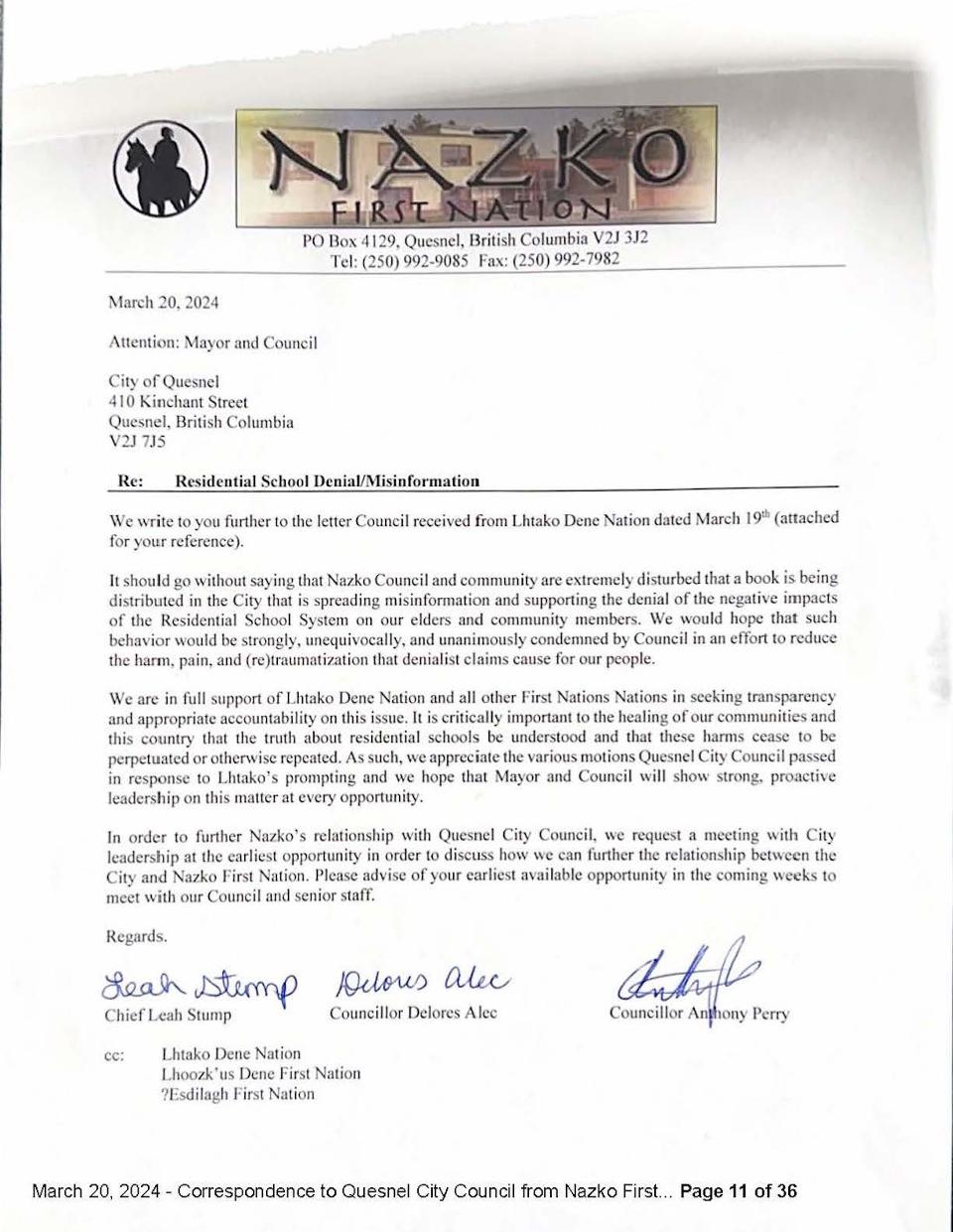
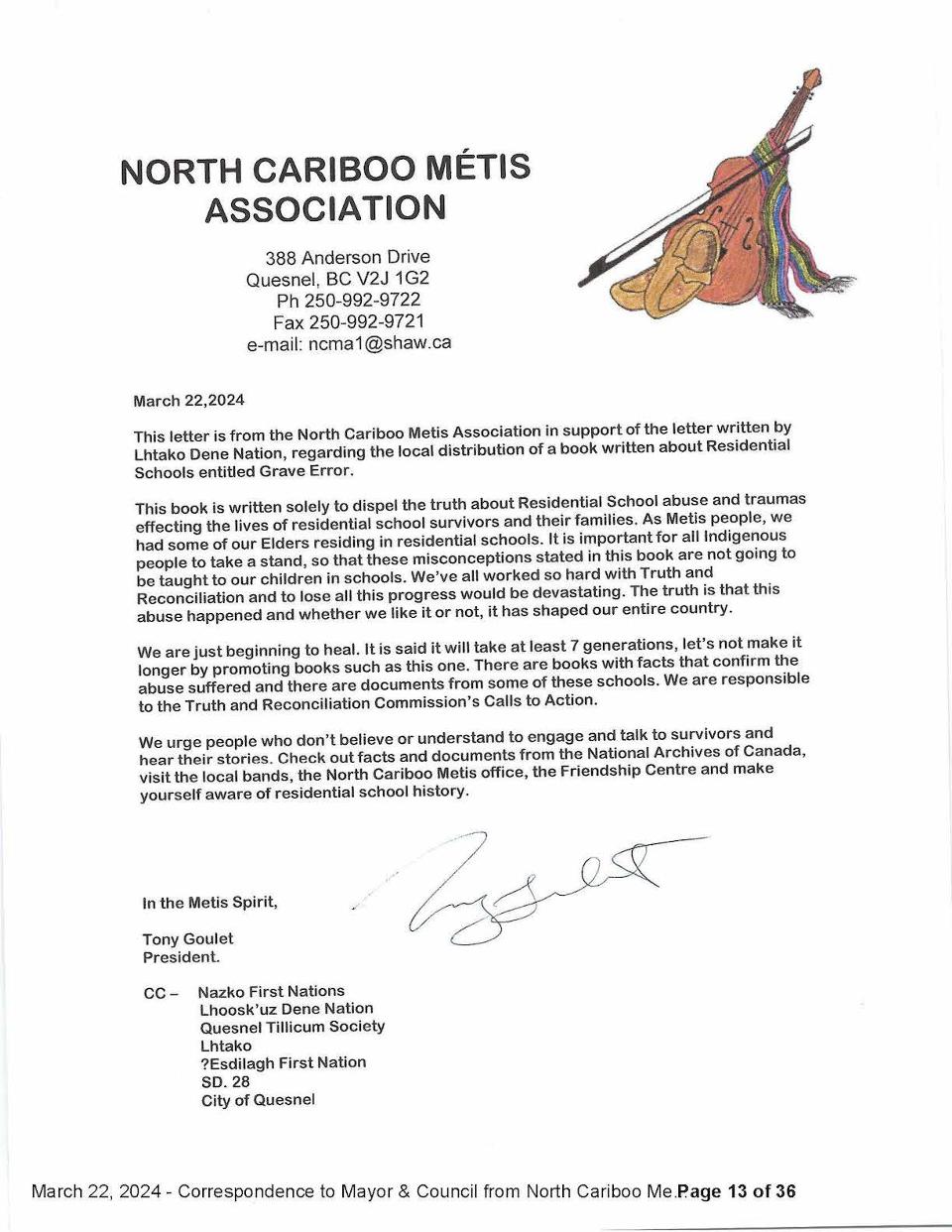












Tyee Commenting Guidelines
Comments that violate guidelines risk being deleted, and violations may result in a temporary or permanent user ban. Maintain the spirit of good conversation to stay in the discussion and be patient with moderators. Comments are reviewed regularly but not in real time.
Do:
Do not: